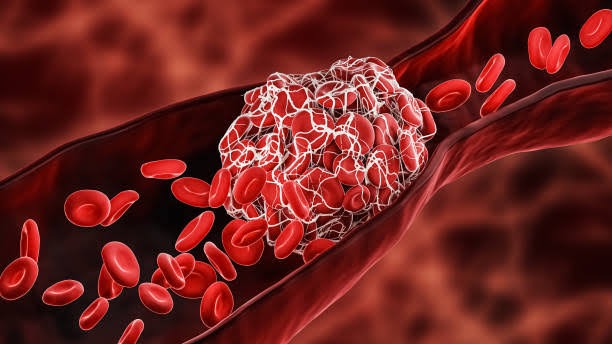What to know about anticoagulants
[ad_1]

Society news
According to NHS, Anticoagulants are medicines that help prevent blood clots. They’re given to people at a high risk of getting clots, to reduce their chances of developing serious conditions such as strokes and heart attacks.
A blood clot is a seal created by the blood to stop bleeding from wounds. While they’re useful in stopping bleeding, they can block blood vessels and stop blood flowing to organs such as the brain, heart or lungs if they form in the wrong place.
Anticoagulants work by interrupting the process involved in the formation of blood clots. They’re sometimes called “blood-thinning” medicines, although they don’t actually make the blood thinner.
Although they’re used for similar purposes, anticoagulants are different to antiplatelet medicines, such as low-dose aspirin and clopidogrel.
Types of anticoagulants
The most commonly prescribed anticoagulant is warfarin.
Newer types of anticoagulants are also available and are becoming increasingly common. These include rivaroxaban (Xarelto), dabigatran (Pradaxa), apixaban (Eliquis), and edoxaban (Lixiana).
Warfarin and the newer alternatives are taken as tablets or capsules. There’s also an anticoagulant called heparin that can be given by injection.
When anticoagulants are used
If a blood clot blocks the flow of blood through a blood vessel, the affected part of the body will become starved of oxygen and will stop working properly.
Depending on where the clot forms, this can lead to serious problems such as:
1. strokes or transient ischaemic attacks (“mini-strokes”)
2. heart attacks
3. deep vein thrombosis (DVT)
4. pulmonary embolism.
Treatment with anticoagulants may be recommended if your doctor feels you’re at an increased risk of developing one of these problems. This may be because you’ve had blood clots in the past or you’ve been diagnosed with a condition such as atrial fibrillation that can cause blood clots to form.
You may also be prescribed an anticoagulant if you’ve recently had surgery, as the period of rest and inactivity you need during your recovery can increase your risk of developing a blood clots.
How to take anticoagulants
Your doctor or nurse should tell you how much of your anticoagulant medicine to take and when to take it.
Most people need to take their tablets or capsules once or twice a day with water or food.
The length of time you need to keep taking your medicine for depends on why it’s been prescribed. In many cases, treatment will be lifelong.
If you’re unsure how to take your medicine, or are worried that you missed a dose or have taken too much, check the patient information leaflet that comes with it or ask your doctor, anticoagulant clinic or pharmacist what to do.
Things to consider when taking anticoagulants
There are several things you need to be aware of when taking anticoagulant medicines.
If you’re going to have surgery or a test such as an endoscopy, make sure your doctor or surgeon is aware that you’re taking anticoagulants, as you may have to stop taking them for a short time.
Speak to your doctor, anticoagulant clinic or pharmacist before taking any other medicines, including prescription and over-the-counter medicines, as some medicines can affect how your anticoagulant works.
If you’re taking warfarin, you’ll also need to avoid making significant changes to what you normally eat and drink, as this can affect your medicine.
Most anticoagulant medicines aren’t suitable for pregnant women. Speak to your doctor or anticoagulant clinic if you become pregnant or are planning to try for a baby while taking anticoagulants.
Side effects of anticoagulants
Like all medicines, there’s a risk of experiencing side effects while taking anticoagulants.
The main side effect is that you can bleed too easily, which can cause problems such as:
1. passing blood in your urine
2. passing blood when you poo or having black poo
3. severe bruising
4. prolonged nosebleeds
5. bleeding gums
6. vomiting blood or coughing up blood
7. heavy periods in women.
For most people, the benefits of taking anticoagulants will outweigh the risk of excessive bleeding.
Content created and supplied by: Kwajaffa (via Opera
News )
Opera News is a free to use platform and the views and opinions expressed herein are solely those of the author and do not represent, reflect or express the views of Opera News. Any/all written content and images displayed are provided by the blogger/author, appear herein as submitted by the blogger/author and are unedited by Opera News. Opera News does not consent to nor does it condone the posting of any content that violates the rights (including the copyrights) of any third party, nor content that may malign, inter alia, any religion, ethnic group, organization, gender, company, or individual. Opera News furthermore does not condone the use of our platform for the purposes encouraging/endorsing hate speech, violation of human rights and/or utterances of a defamatory nature. If the content contained herein violates any of your rights, including those of copyright, and/or violates any the above mentioned factors, you are requested to immediately notify us using via the following email address operanews-external(at)opera.com and/or report the article using the available reporting functionality built into our Platform
See More
[ad_2]

